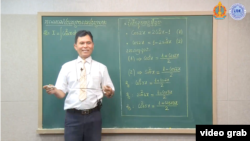The Education Ministry last week released more detailed guidance asking higher education institutions to start conducting classes online, as the government extended indefinitely the closure of schools and universities.
The April 15 notification asked all higher education institutions to prepare for online classrooms and course work for April and May, in light of the ongoing novel coronavirus pandemic.
After announcing the closure of schools and universities on March 14 and suggesting institutions take their pedagogy online, the Education Ministry started producing videos for grades 1 to 12 and streaming them on the “Krou Cambodia” Facebook page and on television.
Education Minister Hang Chuon Naron on Tuesday acknowledged that the quality of education through digital classrooms was limited. It was a better option, he said, given the uncertainty during the novel coronavirus pandemic.
“Not all institutions can do it,” he admitted. “This will help students to continue their studies even though it is not 100 percent as effective as face-to-face classrooms. But it solves the current problem.”
Some public and private universities have already started implementing digital classrooms, while others are in the process of training professors and making sure students were prepared for online courses.
Kean Tak, vice dean for the Faculty of Engineering at the Royal University of Phnom Penh, said on Tuesday the university was preparing course materials and professors for online classrooms, expecting this to be ready next week.
“We are having issues with subjects that need laboratory work,” he said. “We are trying to solve that issue but the course has to go forward. It is not a big issue that the class cannot proceed.”
Some universities are using the Zoom teleconferencing software and Google Classroom online resource, according to Education Minister Hang Choun Naron.
However, there are concerns that not all students are equipped to make use of online classrooms, especially in light of barriers to access to the internet and smart devices.
Ou Virak, founder of Cambodian think-tank Future Forum, said on Wednesday that digital classrooms were a solution for now but it also revealed the social inequality when it comes to the student body.
“It can be done only if the kids in rural areas have a quiet place to study,” said Ou Virak. “Each student will have to have a laptop or tablet at home with good internet coverage, which should be cheap as well.”
No Nimol, a 21-year-old student at Asia Europe University, said on Wednesday that she is studying Chinese through an online classroom, but noticed that some of her classmates were missing.
“Not everyone can attend the class. It is very hard to focus on the teacher. The internet is weak, so the sound is not clear. It is not like studying in a classroom face-to-face with the teacher,” said the student, who is also studying accounting at the National University of Management.




